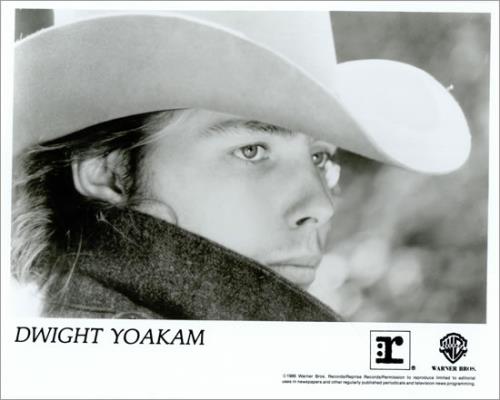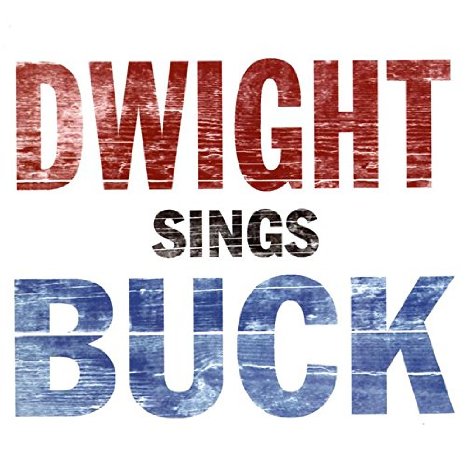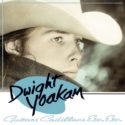| Track | Album |
|---|---|
| Guitars, Cadillacs | Guitars, Cadillacs, Etc., Etc. |
| Little Ways | Hillbilly Deluxe |
| I Sang Dixie | Buenas Noches From A Lonely Room |
| Streets Of Bakersfield | Buenas Noches From A Lonely Room |
| Long White Cadillac | Just Lookin' For A Hit |
| Turn It On, Turn It Up, Turn Me Loose | If There Was A Way |
| A Thousand Miles From Nowhere | This Time |
| My Heart Skips A Beat | Dwight Sings Buck |
| Close Up The Honky Tonks | Dwight Sings Buck |
| Dim Lights, Thick Smoke (And Loud, Loud Music) | 3 Pears |

(promo photo by Otto Felix)
Contributor: Andrew Shields
Like Lyle Lovett, Steve Earle and Randy Travis, Dwight Yoakam was one of a group of remarkably talented country singers who released their debut albums in 1986. This group also included k.d. lang and they often tended to be linked together by the music press as being part of what was described as the ‘New Traditionalist’ movement in country music. However, while they all shared a deep respect for the pioneers of country music in the 1950s and early 1960s, over time, the musical differences between them were to become increasingly evident. Indeed, it quickly became apparent that while Yoakam was strongly influenced by the great ‘honky tonk’ singers of the 1950s like Hank Williams and Lefty Frizzell, he also owed a particular debt to those California-based country artists who had developed the ‘Bakersfield’ sound from the early 1960s onwards. This group included Buck Owens, who was Yoakam’s particular hero, and the late great Merle Haggard. Their sound had generally been rougher-edged than its Nashville counterpart and it had also been more open to influences from rockabilly and rock and roll than was the latter. It was a style that had been forged in the clubs there which had a tendency to be rough, rowdy and rambunctious and these qualities had left a clear imprint on the music.
Yoakam’s distinctive musical style was also due, in part at least, to the nature of his upbringing. His family originally came from Kentucky, where he lived until the age of two. At that point, they moved to Columbus, Ohio. The family’s regular trips back home, however, meant that Yoakam soon developed a keen interest in, and a deep respect for, the ‘old time’ music that he heard there. At school in Ohio, he also developed a keen interest in rock and pop music, one early favourite being The Monkees. This combination of musical influences also meant that he was interested, from an early stage, in those early pioneers of what was to become known as ‘country rock’ such as The Byrds and The Flying Burrito Brothers. Of the artists involved in those groups, it was people like Chris Hillman, Gene Clark and Gram Parsons who were to have the most influence on Yoakam’s later style.
Having been involved in a rockabilly band while still at school, Dwight Yoakam’s first serious attempt to pursue a musical career came in the mid-1970s when he moved to Nashville. As it turned out, his failure to achieve much headway while living there left him with a persistent sense of grievance against the country music establishment. In response, Yoakam, who also had aspirations to become an actor, decided to move to California where he could pursue both that and his musical ambitions. Fortunately for him, his move to Los Angeles coincided with the emergence of a vibrant club scene there. This scene was centred on a number of outstanding new groups which included acts of the calibre of The Blasters, The Gun Club, Los Lobos, Lone Justice and X. A shared feature of several of these acts was that they combined a reverence for various aspects of American popular music (for rock and roll, for example, in the case of The Blasters and the blues with The Gun Club) with what could be described as a post-punk attitude. From his early days in LA onwards, Yoakam, who was much more traditionally minded than his peers, nevertheless began to develop a similarly revved up approach to country music.
While Yoakam was unhappy with the label, the term ‘Cowpunk’ began to be applied to his music around this time and it has remained in use ever since. Over time, this approach to the music was to win him a loyal following on the LA club scene. Indeed, many of those new fans were people who had had little interest in country music up to that point. However, it was only when Yoakam recruited the guitarist and producer, Pete Anderson, into his band in 1984 that the final piece of his musical jigsaw, as it were, fell into place. The combination of Anderson’s superb guitar work with Yoakam’s fluid vocal style gave the latter’s music a potency, both in artistic and commercial terms, which it had lacked up to that point. In this respect, his role in Yoakam’s career was similar to that which Kyle Lehning, another superb producer, played in relation to Randy Travis. The galvanising effect which Anderson’s production had on Yoakam’s music was first made evident in the EP Guitars, Cadillacs, Etc., Etc. which was issued on the independent label, Oak Records, in 1985. Its relative success led a number of major record labels to take an interest in Yoakam and in the following year he signed with Warner Brothers/Reprise.
His first release under their imprint was a reissue of that EP with four new added tracks. Of these, I have selected the title song, Guitars, Cadillacs, which had not appeared on the original record for inclusion here. In many respects, the song could be taken as a mission statement by Yoakam and its combination of old time elements (including the bluegrass style fiddle by Brantley Kearns) with the revved up approach which he and his band had honed on the LA club scene, laid the template for much of his later work.
My next selection, Little Ways, from Dwight Yoakam’s excellent second album, Hillbilly Deluxe, adopts a similar approach while his vocal on it shows a clear debt to one of his early idols, Elvis Presley. Indeed, the same album also included a blistering cover version of Little Sister, a song closely associated with Presley, while in 1992 Yoakam recorded a fine version of Suspicious Minds for the soundtrack of the movie “Honeymoon In Vegas”.
In my opinion, the next choice here, I Sang Dixie, ranks among Yoakam’s very finest songs. In a sense, the song is a tribute to his southern roots, but the lyric also displays a depth and subtlety which was new to his work. It also showed an ability to tread that fine line between pathos and sentimentality in a way which many other country songs fail to do.
Throughout his career, Yoakam has repeatedly stressed the debt which he owed to the music of Buck Owens. One of the ways in which he sought to repay it was by attempting to persuade the older man to return to the music business after his partial retirement from it in 1980. In this, Yoakam proved successful and the two men regularly appeared on stage together from 1987 onwards. They also recorded the superb duet version of Streets Of Bakersfield which appeared on Yoakam’s 1988 album Buenas Noches From A Lonely Room. In a recent interview, he has talked about his desire to create a ‘joyful noise’ with his music and this track epitomises this trait as much as anything else he has ever recorded. Its exuberance is further enhanced by the superb accordion playing on it by the great Flaco Jiménez.
In his early days in the music business, Dwight Yoakam had frequently been an opening act for the great group, The Blasters, fronted, of course, by the Alvin brothers, Dave and Phil. From his very earliest days, the former had been a keen admirer of Yoakam’s music and had done whatever he could to promote his career. It was, perhaps, fitting then that when Yoakam came to record some new material for the compilation album, Just Lookin’ For A Hit, he chose to cover one of Dave’s best songs, Long White Cadillac. It was also fitting that the song was a tribute to the great country songwriter, Hank Williams. While The Blasters’ own version had been an excellent one, Yoakam’s searing take on it raised it to a new level of intensity. The song also proved to be a showcase for the remarkable understanding that had evolved between Yoakam as a superb vocal stylist and Peter Anderson as a master country lead guitarist. It was probably the case that Yoakam would never again record anything which had quite the same white-hot level of energy that this track possessed. It displayed his supreme mastery both as a vocal stylist and as a musician who could fuse very different types of musical influences into a new blend which was entirely his own.
A cornerstone of Dwight Yoakam’s music throughout his career has been his deep respect for, and knowledge of, the great honky tonk artists who recorded from the mid-1950s onwards. Reflecting this influence, the song Turn It On, Turn It Up, Turn Me Loose from his 1990 album, If There Was A Way, is quite simply a classic of the genre.
My next selection, A Thousand Miles From Nowhere, is a fine country ballad, with a lyric which shows Yoakam’s ability to deal with abstract quasi-philosophical themes in a manner which was, perhaps, unusual for a country singer.
Yoakam’s closeness to Buck Owens, who had once claimed that he should have been one of his sons, meant that on the latter’s death in 2006 it was natural that he should record a tribute to the man who had been both a mentor and one of his most formative musical influences. Indeed, it could be claimed that this was an album which Yoakam had been born to make. There was, of course, also a possibility that such an album could misfire or that it could be a mawkish and overly reverential piece of work. In the event, it avoided such pitfalls and was clearly one of the finest tribute albums to be recorded in recent times. Its success lay principally in Yoakam’s combination of deep respect for Owen’s music with a willingness to interpret it in his own distinctive way. From its opening track, My Heart Skips A Beat (which I have chosen from it), the album was also marked by an engaging and infectious enthusiasm which was clearly born out of Yoakam’s love of Owen’s music and his deep respect for him as a man. On Close Up The Honky Tonks he also demonstrated his willingness to re-arrange one of Owens’ classic songs, making it both darker and, perhaps, more compelling in the process.

My final selection here, Dim Lights, Thick Smoke (And Loud, Loud Music) from Yoakam’s 2012 album, 3 Pears, is a classic honky tonk song which Dwight covers in his trademark revved up ‘Cowpunk’ style. It clearly shows that the remarkable fusion of musical styles which he has pioneered from the time of the release of his classic first album almost thirty years ago has lost none of its potency over the years. Indeed, his singular vision has helped him to create a body of consistently excellent work with which only a handful of contemporary country artists can compete.
Postscript: I began writing this piece before hearing of the sad news of the death of the great Merle Haggard. In a sense, this piece can be seen as an oblique tribute to him as Dwight is by far the best of the living disciples of the progenitors of the Bakersfield sound. This YouTube clip shows the two of them having an interesting discussion on the differences between it and its Nashville counterpart. There is also a Rolling Stone interview here where Dwight talks about Merle’s life and his influence on him.
Dwight Yoakam official website
Dwight Lightning: A Dwight Yoakam fan site
Dwight Yoakam biography (Apple Music)
Andrew Shields is a freelance historian, who grew up in the West of Ireland and currently lives in Sydney, Australia. Along with an interest in history, politics and literature, his other principal occupations are listening to and reading about the music of Bob Dylan and, in more recent years, immersing himself in the often brilliant and unduly neglected music of Phil Ochs …
Read some of Andrew’s other toppermosts on Lyle Lovett, Steve Earle, Randy Travis, Merle Haggard
TopperPost #524








That’s a fine selection and I’m not going to quibble with any of it, though if I had to pick a #11 it would be Two Doors Down from dwightyoakamacoustic.net – the stripped down version of that song just adds something extra.. it’s got ‘the spook’, as Neil Young calls it.
I am procrastinating over a blog post about 1986, because with the benefit of hindsight, that’s where my taste in music broadened dramatically, and I started to listen to country music (and more soul, and African, and folk). Guitars Cadillacs Etc, Storms of Life, Lyle Lovett, Guitar Town – the four albums that kicked me off, moving forwards and also looking back.
Keith, thanks for this. Agree that ‘Two Doors Down’ is a great song and with your choice of version. It and Dwight’s excellent rendition of Johny Horton’s ‘Honky Tonk Man’ just missed out on the final cut here. Like many people of our vintage, I first got into country through Elvis Costello’s album, ‘Almost Blue’. Funnily enough, the artists EC covered on that record – people like George Jones, Merle Haggard and Charlie Rich – now mean more to me than he does.
However, it was only when I lived in Canada in the late 80s that country music really began to make sense to me in a deep way. Of course, the fact that Irish country music is among the worst forms of music in the world (apologies Big Tom fans) may have played a role in my initial resistance to the genre. It was in Canada that I really begin to appreciate the artistry of people like Randy, Steve, Lyle and Dwight…
Thanks Andrew for a great introduction to Dwight. He’s a guy I’ve been aware of for quite some time and been intending to investigate further. You’ve given me an excellent starter kit to do so.
I’m a big fan of If There Was a Way and as such I’d have included Heart That You Own (even Hank would have been impressed with “I pay rent on a run down place,there aint no view buts there’s lots of space, for my heart, the heart that you own..”) and You’re The One, but then I’m completely soft for Dwight’s love songs. This is an impressive list and i’m glad to see an entry from 3 Pears which is a really good record. Special mention too to Under the Covers and his fantastic versions of Train in Vain,North to Alaska and one of my favourite Fab covers Things We Said Today.
While I’ve always looked at Dwight through the prism of the Hank to Buck line what your review highlights is how he also nicely appropriated and renewed the influence of Billy Sherrill’s 60’s/70’s Nashville sound. There was nothing wrong with what he did with Charlie Rich,George Jones and Tammy Wynette as such, it was what it became,especially in the late 70’s early 80’s that was problem. Strings and pedal steel work well when you get it right and Dwight pulls all the right threads together to give us a brilliant take on both kinds, country and western…I saw him in 2004 with a great band,plenty of Telecaster twanging,fiddling and heartfelt laments,absolutely brilliant. Great toppermost,thanks.
Glenn & Dave, thanks for comments. Glenn – If There Was A Way was the first Dwight album I bought and it remains one of my favourite of his. Both the songs you mention could also have easily made it on to this list. It may also be worth reiterating what a fine singer Dwight is – at his best he belongs up there with the greatest country vocalists…
Traveling through Bakersfield on the major US Highway (US 99) connecting LA to the south and Sacramento to the north, you pass exits for two local thoroughfares: Buck Owens Boulevard and Merle Haggard Drive. They should have another named for Dwight!
Thanks Steve and definitely agree. Dwight very much the carrier of the Bakersfield torch. And after visiting Rowland S. Howard lane in Melbourne a few years back, my next pilgrimage should be to Merle Haggard drive… Not sure if you would have seen this Steve?